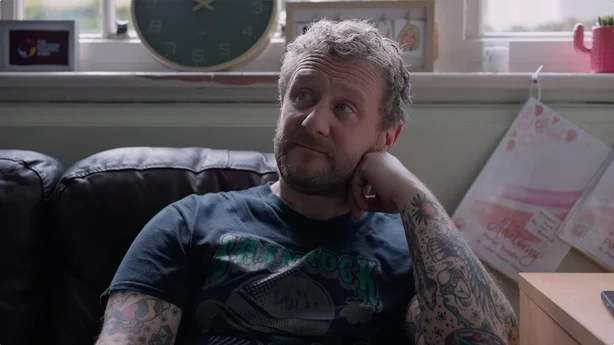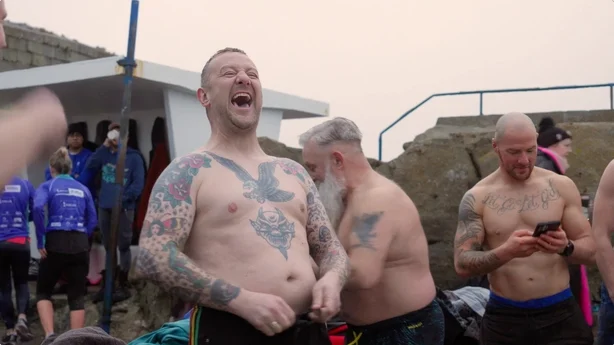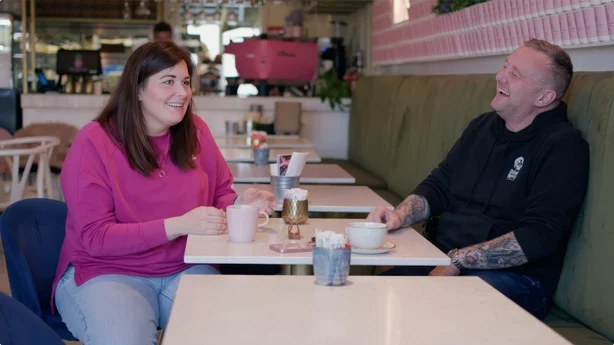It would be an understatement to say the comedian, actor, radio presenter, and writer has had an eventful few years. In 2022, he had a life-saving 11-week stay in St Patrick's hospital in Dublin after battling anxiety and depression. In November of that year, he lost his mother Helen. The following August, he welcomed twins, a boy and a girl named Milo and Stevie, with his partner Kelly Doolin.
Having spoken openly about his mental illness struggles on The Late Late Show and exploring the trauma of his childhood and the loss of his mum in his memoir Madhouse, PJ is no stranger to laying his troubles bare.
PJ Gallagher - Changing My Mind
— Tyrone Productions (@tyronetv_irl) May 14, 2024
Following a lifesaving stay at St Patrick's Mental Health Services, PJ embarks on a mission to sustain his mental health and well-being. Don't miss it, Monday at 9.35pm on @RTEOne #PJGallagher #ChangingMyMind @pjgallagher @JFLdotCOM @PietaHouse pic.twitter.com/FE99u2vn3Y
However, he's quick to admit this programme is "the hardest thing I've ever worked on".
"I made life very difficult for people around me again, to be honest," he says candidly. "Because it's just so personal. So much was happening at the time, the birth of the kids - that all happened when we were making the show. When I think about it now, what was I doing?"
PJ is clear about what he wants viewers to take from the documentary. "My whole thing is, I'm not a [mental health] professional," he says. "I don't really know what to tell people and this is an exploration of what's out there. 'Here's what I did, I hope it helps', that's kind of the message.
"And to try and put it out there that nothing bad will happen. Whatever position you're in now, however bad it is, things can get better. They won't get worse.
"Once you tell one person it becomes easier to tell two, when you've told 10 it starts to feel easier to tell 20. Then the next thing you know, you're on The Late Late Show, wondering if you should have said anything at all!"
"If I'm really honest about it, the first time I went on the Late Late, it was more of a selfish thing. 'Let's stop the conversation' was what I was thinking. I felt like I owed people an explanation for why I disappeared off the face of the earth. I felt like I owed it to the listeners to the show on Nova, I felt like I owed it to Jim (McCabe, his Morning Glory co-host).
"I thought, 'I'll go on the Late Late, I'll say it once and I'll never have to talk about this ever again'."
That's not exactly how it all played out. He went on to write a moving memoir about his upbringing and childhood trauma, revealing his parents' struggles with alcoholism, which he discussed in another Late Late appearance.
But PJ thinks this documentary "might be the end of it".
"There comes a point where I have to stop talking and just get on with my life. This is probably that point. But it did feel like it was necessary, and people do ask questions. 'What should I do?' I don't know. But now I can say, 'Watch this documentary and hopefully there's something there for you'. There is no one way to get better - you have to try everything."
The documentary shows PJ's nerves about welcoming twins at the age of 48. The worry about sleep deprivation went far beyond that of most parents-to-be, as it's such a crucial part of staying well. As Milo and Stevie are about to hit the nine-months-old mark, how is he coping now?
We need your consent to load this Instagram contentWe use Instagram to manage extra content that can set cookies on your device and collect data about your activity. Please review their details and accept them to load the content.Manage Preferences
"It's tough," he says. "It was easier for me at the start, it's getting harder for me now. Because we've no family around us to help at all, [at the newborn stage] we were struggling to the point that Kelly went back to America for six weeks.
"It's only now that they're hitting nine months that he [Milo] is starting to keep me awake and I'm really finding it hard. So much of me staying healthy is about routine. And right now, routine kind of doesn't exist. You learn to say no to everything. I have to just be here [at home]. That's what helps and remembering it won't last forever."
He is typically frank about the realities of becoming a father to tiny babies at this stage in his life.
"I'm 50 next year. What on earth was I thinking?! It is a huge transition because you can't help but grieve your previous life - all the hobbies you used to do, walking out and meeting your mates, having pints.
"You think, having kids won't take over, but forget it. It takes over everything!"
He describes his Boston-born partner Kelly, a Clinical Scientific Expert in Neuroscience and Psychiatry, as "brilliant".
"She's very American about things, I mean that as a compliment," he laughs. "Living with an American is kind of like watching Dawson's Creek – they never have an emotion they don't feel like they have to share, which is quite alien to Irish people!"
We need your consent to load this Instagram contentWe use Instagram to manage extra content that can set cookies on your device and collect data about your activity. Please review their details and accept them to load the content.Manage Preferences
PJ's aversion to talk therapy is explored in the documentary as he seeks out other forms of treatment.
With the stark statistic that suicide is the leading cause of death in men under 25 in Ireland [CSO Suicide Statistics 2020, released November 2023], he explores how men's groups can create connection and give them a space to talk about the difficulties they are facing.
"Face-to-face can be a very uncomfortable place to be, it's too intense," he explains. "It can be counterproductive; it has been counterproductive for me. I get less out of therapeutic sessions than I get out of being in groups, where men are shoulder-to-shoulder and not face-to-face.
"It's really difficult for people to do, but these groups are free. And with any group you're in, it's probably easier to bring this up than you think it is, to start these conversations."

One particularly powerful scene in Changing My Mind shows PJ's fellow Pit Stop Krew scooter club member Andy confide in him about how a suicide attempt led him to seek help from Pieta, the Irish suicide intervention charity.
PJ's own crisis moment came in 2022, when thankfully he turned to his best friend, the writer Stefanie Preissner.
"I remember saying to myself, 'I won't see the end of this day'. And that was the plan. Then there was a message on my phone from Stefanie saying no time was too early or late, give me a call. That was the moment that changed everything."
He describes the depression he experienced as "a constant voice in your head telling you you shouldn't be around. It's making every cell in your body try not to exist anymore."
"The focus has to be making the voice go away," he says. "Bringing in other people's voices, your friends' voices, your family's voices, your doctor's voice, medication, therapists, whatever it is, to fill your head with different stuff.
"I couldn't have done it on my own. It was too big, I let it get too far. It starts out small and then it gets so loud, so constant, so big.
"I remember the moment I said to the doctor, 'If I go to hospital, I'll lose my job, lose my friends, what will I have then?' And he said, 'You'll have your life'. That was the first moment I realised, 'Maybe there is some value in that'. It was the greatest thing I've ever done, going in there."

He was lucky to be able to access the best of care in St Patrick's hospital.
"I did, but not everyone has that. Hardly anyone has that and that that is the problem," he says.
"When you look at Andy in the documentary, who didn't have the access I had, those are two different [experiences]. He went through Pieta and they were great for him, but it would be very hard if he had needed to go to hospital, I don't know what he would have done.
"That's the one criticism I get, that I have luck that other people don't and that's true. There's a lot of people who end up like I did and just don't make it because they can't get the intervention that they need. It's a terrible fact.
"I really don't want to bash the services because I've only had good experiences, and the people that are working there really are doing their best. It is getting better, but it's still nowhere near good enough."
Through the process of making the documentary, PJ was encouraged to be assessed for neurodivergence by his friend Stefanie and subsequently discovered he has ADHD (Attention Deficit Hyperactivity Disorder).

He admits it was a strange thing to go through on camera.
"I still don't know how I feel about it," he says. "It's great to have it done, but to be totally honest with you, I'm not sure how comfortable I am with it, with knowing.
"It answers great questions, it really helps me know a lot about myself in the past and why I do things in certain ways, but I still don't really know what it means.
"And I think I'm deliberately avoiding that, unhealthily. For all the stuff I'm talking about - 'There shouldn't be a stigma' - for me, there's still a stigma with that in my head."
This is surprising to hear, and PJ tries to explain: "I don't know what it is. I remember rolling my eyes at myself at one point and thinking, 'Oh my God, another f***ing person in the media saying they're neurodivergent...'
"Because so many people in the media or online are saying [that they’re neurodivergent] now, me saying it made me roll my eyes at myself and go, 'Of course, you are another one'.
"That's me stigmatising myself again. I'm working on that at the minute."
He adds: "It does make a lot of sense to me. And I'm glad I did it. It was the right thing to do. The options were given to me about what I could do going forward. Currently, I don't really want to do anything about it and I'm functioning fine and enjoying life.
"I don't see any reason to change anything. It's a journey and I'm only at the start of it. I'm at the end of the anxiety and depression bit, I know how to tackle that, I know how to deal with that, I know how to manage that. I'm literally only starting with ADHD."
This past month has been chaotic with the release of the paperback edition of his memoir, the new season of The Young Offenders (which he gushes that he "just loves" working on) airing on BBC One, the documentary set to be released, and all of the daily drama that comes with life with twin babies.
We need your consent to load this Instagram contentWe use Instagram to manage extra content that can set cookies on your device and collect data about your activity. Please review their details and accept them to load the content.Manage Preferences
Does he like being this busy?
"No! No. This is too much," he laughs. "But I'm able to say that now, to say it is too much. I'll do nothing next month, I'll do nothing for anyone. And I might do nothing for anyone the month after that, too.
"My focus is to get back on the radio and do very little else for a while, right to the end of the year, and then reassess."
For now, his thoughts are centred around the documentary and how it will be received.
"There's nowhere to hide with this. Everyone knows everything now," he says.
"I hope somebody gets something from it, I really do. When I'm walking around the supermarket in the next few weeks and see who I get talking to, that's how I'll know if I made an impact or helped them or not."
Disclaimer: The copyright of this article belongs to the original author. Reposting this article is solely for the purpose of information dissemination and does not constitute any investment advice. If there is any infringement, please contact us immediately. We will make corrections or deletions as necessary. Thank you.






